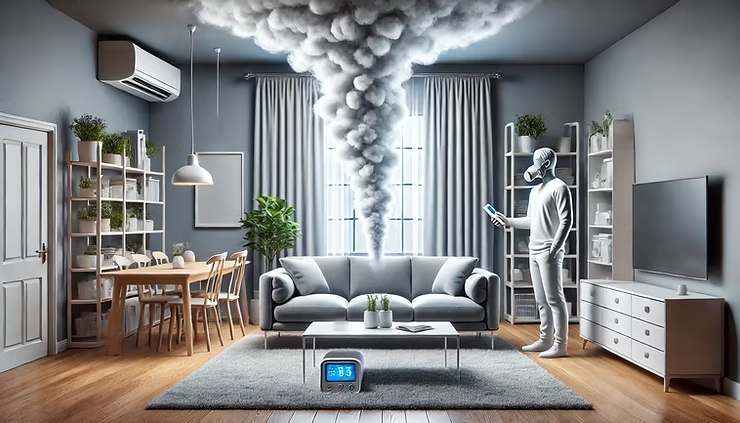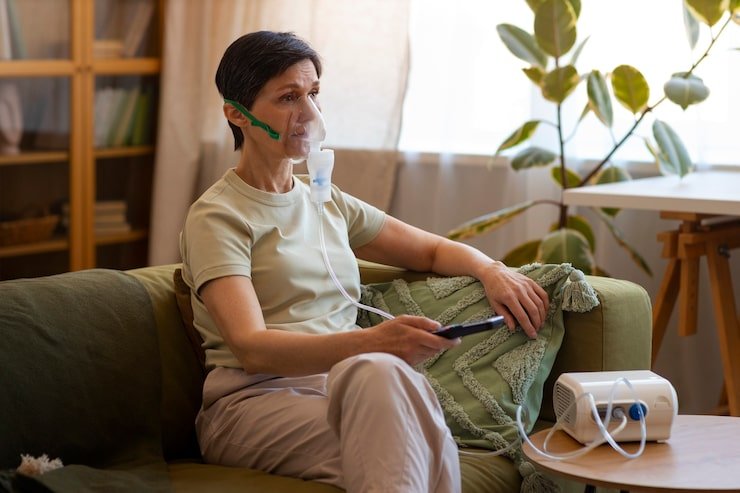How Often Should You Test the Air Quality in Your Home?
- admin323029
- Blog

We often think about the quality of the food we eat or the water we drink—but what about the air we breathe every day? Indoor air plays a major role in your overall health and comfort. Yet, it’s easy to overlook, especially when there are no obvious signs of a problem. Regular air quality testing is essential to make sure your home is a safe and healthy environment.
In this post, we’ll explore how often you should schedule focus keyword (air quality testing), why it matters, and what specific situations in Massachusetts and New Hampshire make testing even more important. Whether you’re dealing with allergy symptoms or just want peace of mind, knowing when to test your air can make a big difference.
Why Testing Your Indoor Air Is So Important
Indoor air can be more polluted than outdoor air—sometimes up to five times worse, according to the EPA. Common indoor air pollutants include mold spores, VOCs (volatile organic compounds), dust, carbon monoxide, and radon. These pollutants can cause allergies, asthma, fatigue, respiratory illness, and other health issues.
Many of these substances are invisible and odorless. Without proper focus keyword in place, you may not realize your air is compromised until symptoms arise. That’s why periodic air quality testing is so valuable—it gives you clarity about what’s in your air and how to fix it.
How Often Should You Schedule Air Quality Testing?
The general recommendation is to conduct focus keyword every 2 to 3 years under normal conditions. However, there are circumstances where more frequent testing is wise. These include:
-
After Renovations or Remodeling: New materials, paint, and flooring can release harmful VOCs.
-
When Buying or Selling a Home: Testing can uncover hidden issues like mold or radon.
-
After Water Damage: Any flood or leak can lead to mold growth behind walls or in crawl spaces.
-
If You Notice Unusual Symptoms: Headaches, allergies, or fatigue may be signs of poor indoor air.
-
Homes with Children or Seniors: These groups are more vulnerable to pollutants and allergens.
-
Seasonal Considerations: In Massachusetts and New Hampshire, homes are sealed tightly in winter, which can trap indoor pollutants.
By scheduling focus keyword regularly and after major life events, you help ensure a healthier living space year-round.
The Risks of Delaying Air Quality Testing
Neglecting air quality testing can allow small problems to grow into major health or financial concerns. For example:
-
Mold behind a wall can spread unnoticed, affecting indoor air and triggering health problems.
-
Undetected radon exposure is the second-leading cause of lung cancer in the U.S.
-
VOCs from building materials can cause chronic irritation and contribute to long-term health issues.
-
Poor ventilation can trap allergens, increasing asthma and allergy symptoms.
If you’re living in older homes typical of areas like Boston, Manchester, or Salem, air quality problems may already exist due to outdated construction materials or poor ventilation.
What Happens During a Professional Air Quality Test?
A certified air quality specialist uses a variety of tools and techniques to evaluate your home’s air. These may include:
-
Air Sampling: To measure mold spores, pollen, dust, and VOCs.
-
Humidity Monitoring: Since excess moisture supports mold growth.
-
Radon Testing: Especially relevant in New Hampshire, where radon levels tend to be high.
-
Real-Time Gas Detection: For carbon monoxide or other harmful gases.
-
Surface Sampling: To identify mold or bacteria on walls and HVAC systems.
Within a few days, you’ll receive a detailed report outlining what’s been found, how serious the issues are, and recommended next steps.
Why Homeowners in Massachusetts and New Hampshire Should Be Proactive
The climate and construction style of homes in Massachusetts and New Hampshire present unique air quality challenges. Here’s why:
-
Cold Weather: Extended winters mean homes are sealed for months, limiting ventilation.
-
Older Homes: Historic houses may have asbestos, lead paint, or poor insulation.
-
Radon Zones: Both states are in areas with elevated radon risks, according to the EPA.
-
Humidity and Mold: Basement moisture is common, especially in coastal Massachusetts.
Regular focus keyword helps you stay ahead of these regional concerns and maintain a safer, healthier home for your family.
DIY Testing vs. Professional Air Quality Testing
You may find inexpensive home air test kits online, but they often lack accuracy and scope. They may not detect certain mold types, VOC levels, or radon gas with precision. Professional focus keyword provides lab-verified data, interpreted by experts who understand local building codes and regional risks.
In New Hampshire and Massachusetts, a professional test is often recommended during real estate transactions or after basement renovations. Investing in a high-quality inspection once can prevent thousands of dollars in future remediation work.
What to Do After Testing
If your focus keyword shows elevated levels of pollutants, the next step is to address the causes. Common recommendations might include:
-
Improving ventilation or installing mechanical air exchange systems.
-
Using HEPA filters and air purifiers in high-traffic areas.
-
Sealing foundation cracks or adding radon mitigation systems.
-
Removing mold-contaminated materials and fixing leaks.
-
Switching to low-VOC cleaning and building products.
Many improvements are straightforward and can make a big difference in your air quality.
Final Thoughts: Breathe Easier with Routine Testing
You can’t manage what you can’t measure. Regular air quality testing offers a clear understanding of what’s in the air you breathe and how to improve it. Whether you’re a homeowner in Massachusetts with a historic property or in New Hampshire where radon levels are a concern, proactive testing brings peace of mind.
Don’t wait for symptoms to appear. Schedule your professional air quality test today and take the first step toward a healthier home.
FAQs About Air Quality Testing Frequency
1. How often should I schedule air quality testing for my home?
You should perform air quality testing every 2 to 3 years. Test sooner if you’ve experienced recent renovations, health symptoms, or water damage.
2. Are there different rules for testing in Massachusetts and New Hampshire?
Yes. Due to higher radon risks in New Hampshire and moisture in Massachusetts, more frequent focus keyword is recommended, especially in basements or older homes.
3. Is professional air quality testing worth the cost?
Absolutely. Professional air quality testing provides accurate, lab-based data that helps prevent long-term health problems and costly home repairs.
4. Can I rely on home air testing kits instead?
DIY kits can provide limited information but often miss key pollutants. Professional focus keyword ensures you get comprehensive, actionable results.
5. What are the signs I may need an air quality test right away?
Frequent headaches, allergy symptoms, unusual odors, or recent water leaks are all signs that it’s time for air quality testing—especially in sealed-up homes.
Are you worried about the cleanliness of your space?
Let us help you! Cleaning services are our specialty, and we offer a complete range of cleaning and maintenance services. Get a free estimate!




